‘What the Israeli army does in the West Bank is in my name. So I can’t look at myself if I don’t stand against that. I’m doing it so when my grandchildren ask me what were you doing during the occupation, I can answer them.’
*Eran, Israeli human rights activist
As we stood on the hillside, we watched a small group of Palestinian children walk home from school up a long winding road past a settlement. They were escorted by two soldiers on foot, followed by an Israeli army vehicle. Eventually they turned the corner out of sight. An Israeli man, well into his seventies stood near me, speaking Arabic on the phone. When he had disconnected the call, he turned to us and said ‘just five more minutes and then they will be safe’.
He was referring to the children arriving safely back within sight of their village, out of danger from settler harassment. He has been doing this kind of ‘protective presence’ in the South Hebron Hills, the most southerly part of the West Bank, for more than twenty years. He is one of a group of Israeli activists who show solidarity to Palestinians living under Israeli military occupation in the South Hebron Hills and the Jordan Valley.
Many of the Jewish activists drive down to the South Hebron Hills on a weekly basis from their homes in cities such as Tel-Aviv and Jerusalem. They may support Palestinian farmers when they go out shepherding and are vulnerable to settler attacks, or participate in land actions where Palestinians work their land to resist its confiscation. Others are attached to one of several Israeli organisations which work to make visible the realities of the occupation to Israeli citizens.
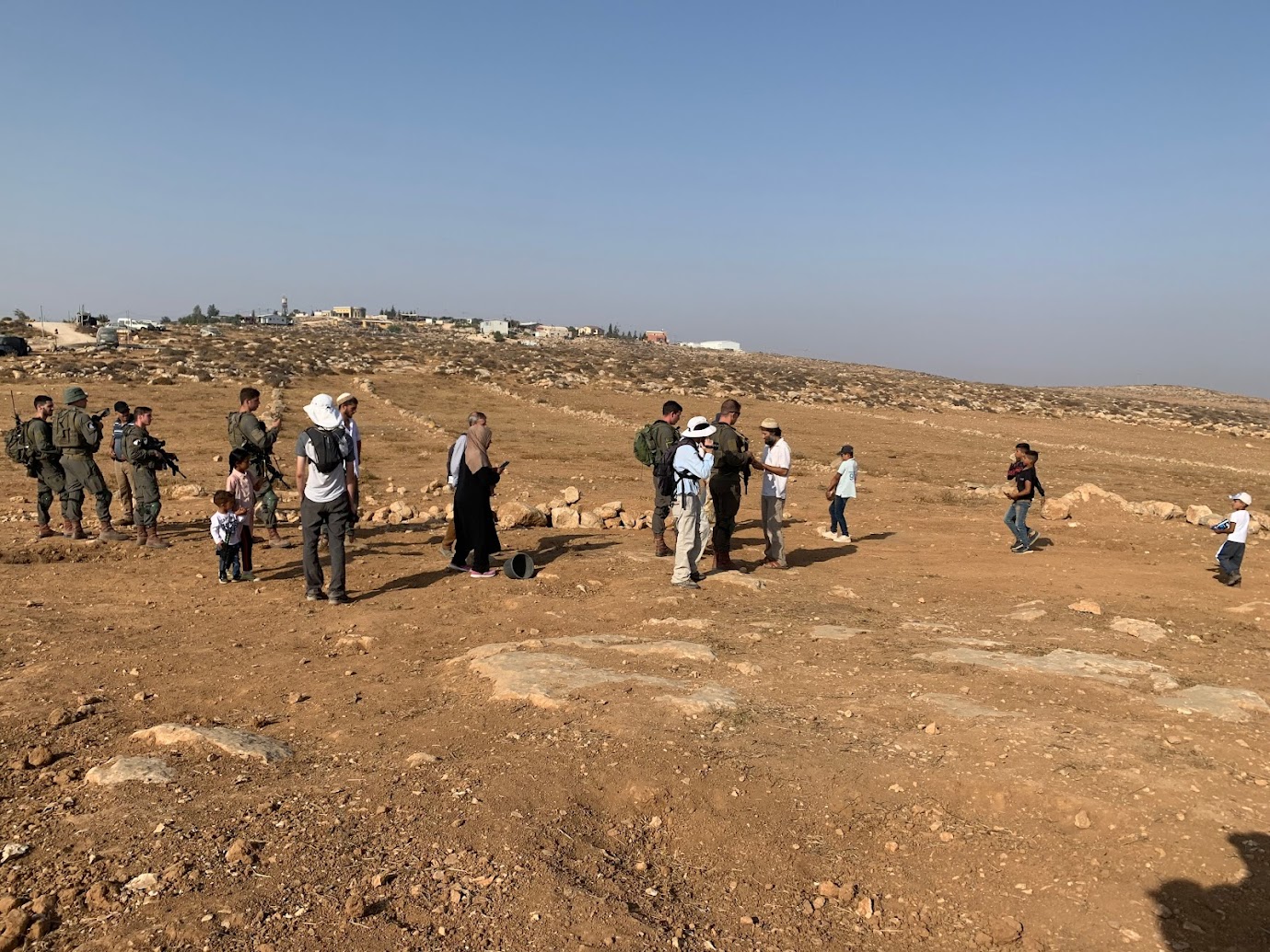
Israeli activists participate in a land action in the South Hebron Hills
On such organisation is ‘Looking the Occupation in the Eye’, which focuses on social media campaigning as well as solidarity actions inside the West Bank. Another is Machsom Watch, which monitors the checkpoints and helps Palestinian workers with getting permits to travel to work inside Israel. The organisation was set up in 2001 by three Jewish women from Jerusalem. They say this on their website:
‘We painfully watch how destructive the occupation is for our own children, the soldiers who only ‘obey orders’ during their military service. We have taken it upon ourselves to recount the reality of the occupation, publicise and pass on to the un-knowing Israeli public what has been taking place just minutes away from their homes and in their names.’
One of their members, *Shahar, who was visiting the South Hebron Hills in September of last year, after a particularly violent attack by settlers on the Palestinian farmer and activist, Hafez Huraini, talked about her motivation:
‘We believe that one day injustice will end. We are all from the same earth and we have to find a solution which is just for all humanity. We have to let people know about the other Israel. Not everyone [inside Israel] is for the occupation, a lot of people think like me. We are forced to send our young people to the army. My sons were both in the army, but they think like us. I am now an old woman, and everyday when I look in the mirror I know I have to work for justice.’
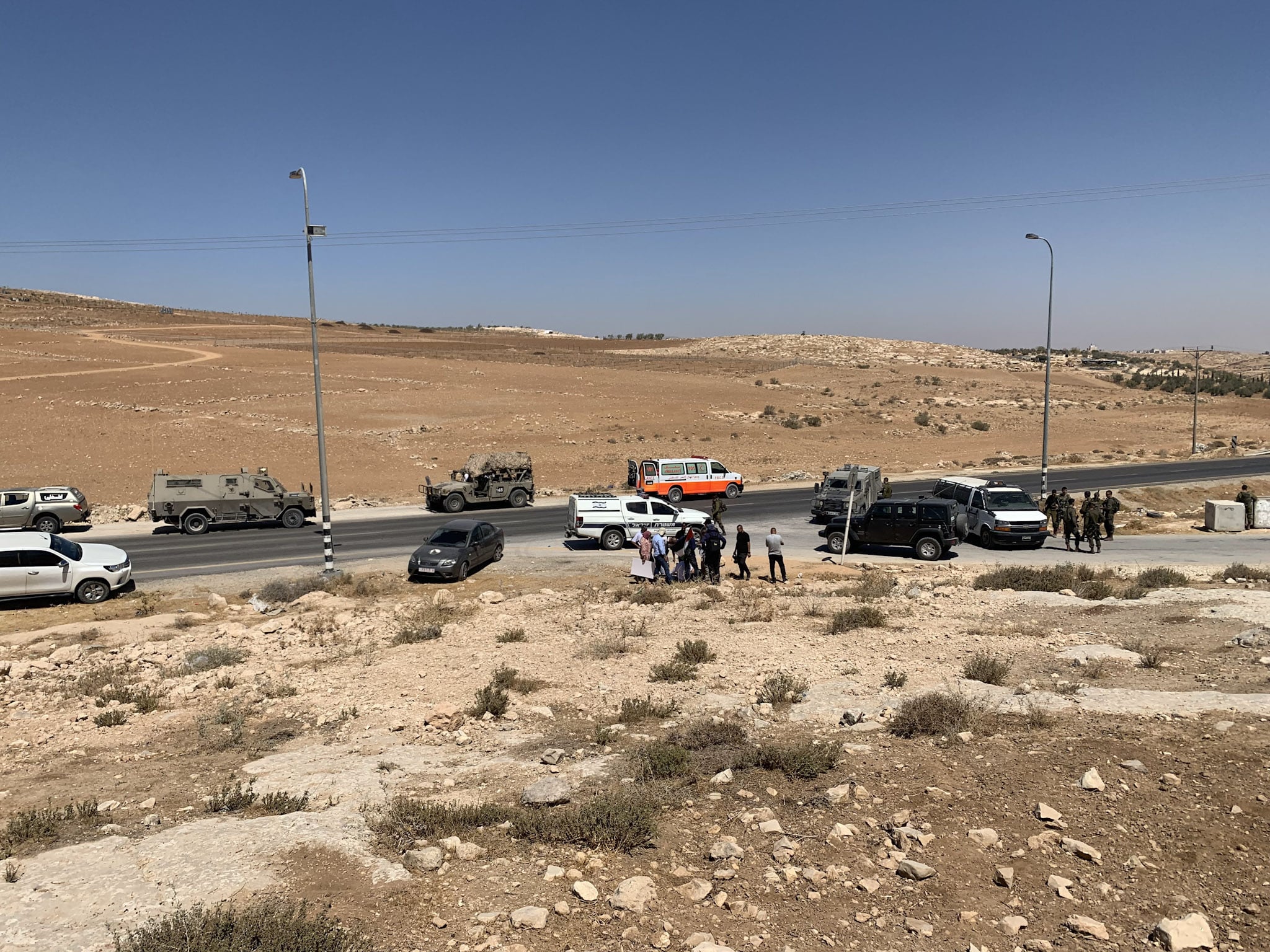
Israeli activists monitor Israeli military activity in the South Hebron Hills
‘Unless you are a settler or a soldier, as an Israeli you don’t see the full enormity of the occupation’
Itai Feitelson, who for the last two years has spent much of this time supporting Palestinians living in isolated communities in the South Hebron Hills, says he grew up in home which was against the occupation in broad terms but were uninformed about the realities, and also didn’t feel anything could be done about it. ‘Unless you are a settler or a soldier, as an Israeli you don’t see the full enormity of the occupation’. He says his family’s attitude in fact amounted to cooperation with the occupation because they never did anything to challenge it.
It was only when he started to read and learn for himself that he started to think critically. He realised there were people who were actively challenging the occupation and decided he wanted to visit the West Bank. He started off helping Palestinian farmers to pick their olives at the annual harvest and joining protests and other direct actions. Gradually he spent more time in the West Bank and started to love the land the people.
‘I realise it’s a privilege that I can be here and do what I find a resonance doing in support of local people, and then go back to earn my living and then come back again. But as an Israeli I feel it is not ethical not to do something.’
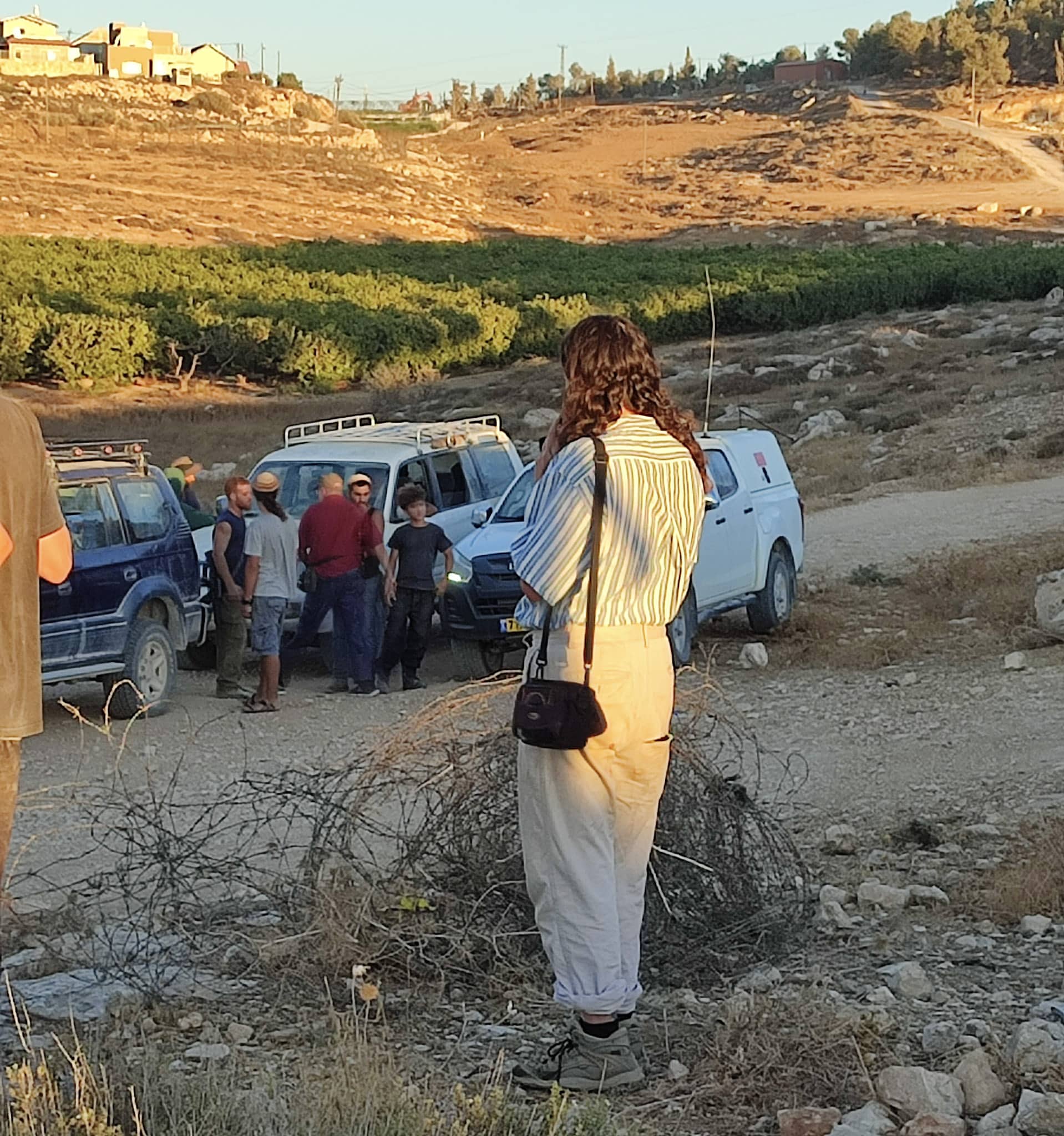
Israeli activists monitor settler activity in the South Hebron Hills
Together with a handful of other young activists, Itai lives most of the time in a small village in the South Hebron Hills. They take Arabic classes with local teachers and spend their days monitoring human rights violations committed by the settlers and the Israeli army and police. They provide protective presence where they can to children walking to school, or Palestinian farmers working their land and sometimes do sleepovers with families who are experiencing settler raids during the night. Because they speak both Hebrew and Arabic they can be negotiate with the army, for example seeking assurances that children will not be harassed. Further reflecting on his solidarity work Itai says:
‘Its hard to feel its worthwhile on a daily basis. It doesn’t feel very often that you are making a difference against such an enormous system of repression. But you do sometimes feel you are making a difference in a small situation.’
Certainly many of the local Palestinians EAPPI spoke to are clear that the Israeli’s solidarity is making a difference:
‘During the coronavirus pandemic when there were no outsiders down here we suffered a lot: there were more shootings and generalized harassment and development of new settlement outposts. If the activists were not here….’
Nasser Adraa, South Hebron Hills
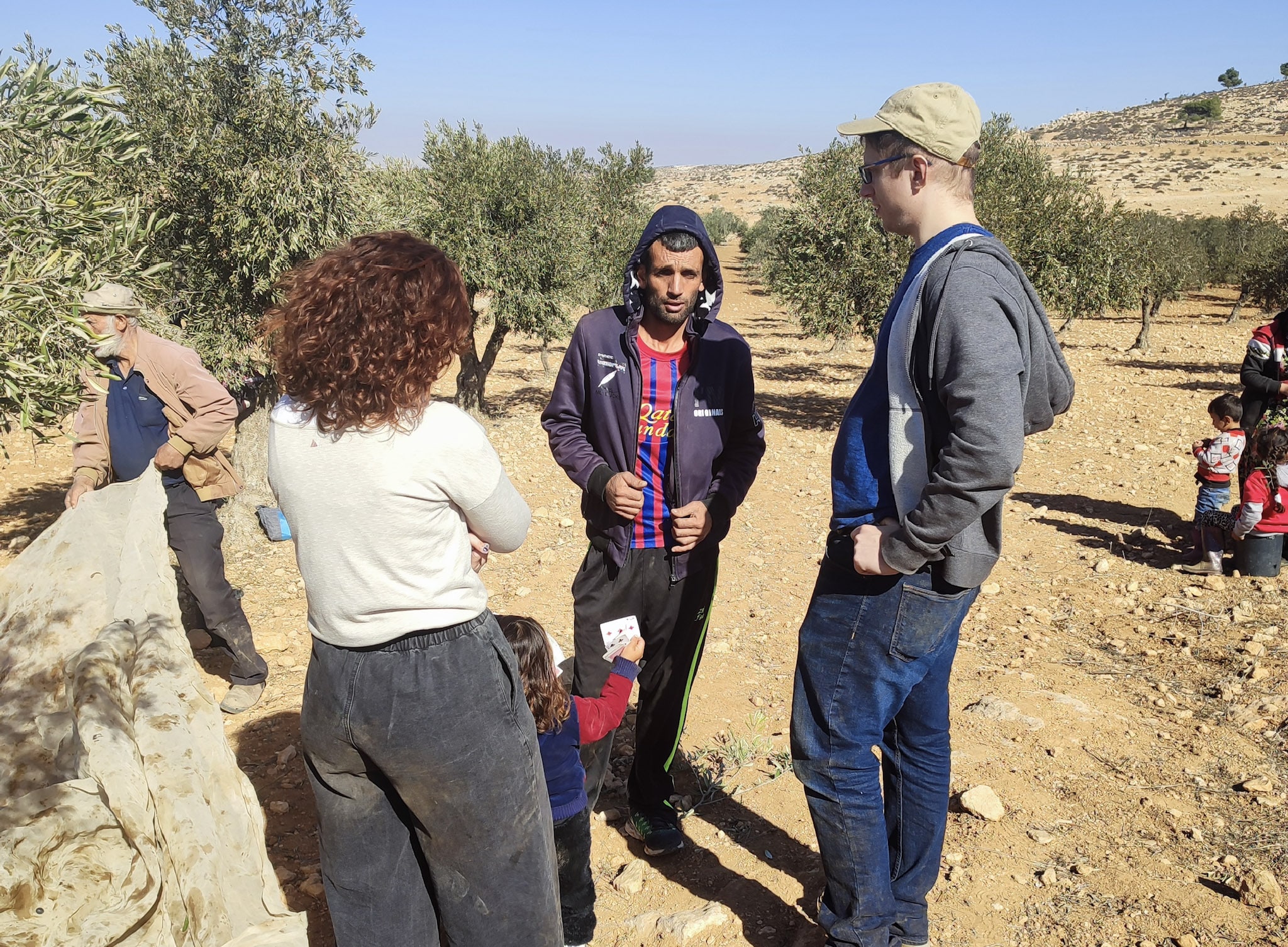
Israeli activists stand in solidarity with Palestinian families during the olive harvest, South Hebron Hills
‘Gradually my walls opened up and there was no way back as I was unlearning everything I had been taught’
Other Israel activists spoke about their motivations to take a stand. *Ariel is 35, and went regularly to the South Hebron Hills for several years to take part in land actions, the olive harvest, and for protests which are sometimes called when particular villages are targeted for harassment by the Israeli army. He now tries to focus more within the 1948 borders, trying to raise awareness within Israeli Jewish society about the injustices of the occupation. Ariel comes from a European Jewish family who immigrated to Israel when he was ten years old:
‘I had a strong Zionist militaristic education. My mother was a former kibbutzim, and believes in peace and a two-state solution, but the society here in Israel is such a militarised society, everything pushes you towards the army. I had to do my military service, and saw many things I did not agree with, but I pushed the questions away. It was not until after my military service that I went to study abroad and had the freedom to think for myself and I started to read about Palestine and watched films, one in particular stuck out for me, 5 Broken Cameras. It was on TV at the time. For me it was about a five to seven year process of growing awareness. I began to meet Palestinians – and I had never met any before – and we became friends, and I met refugees from 1948. Gradually my walls opened up and there was no way back as I was unlearning everything I had been taught. I don’t share everything with my family, but I am much happier now as my activism means there is a resonance between my actions and my beliefs. I feel more complete.’
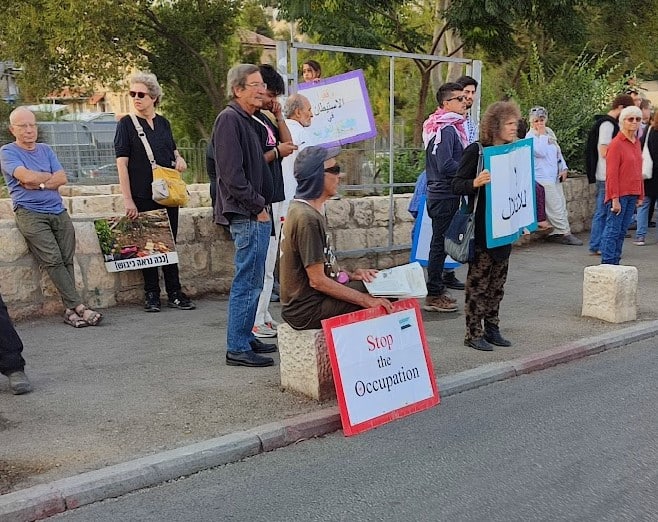
Israeli activists protest settlements and Palestinian displacement in Jerusalem
Ariel* started to focus on other issues which also intersect with the occupation: militarism and the Israeli arms industry, climate justice and anti-racism. ‘Its good to feel in solidarity with people’ he reflects.
‘I used to go to the South Hebron Hills a lot, I participated in building brigades after house demolitions or replanting after settlers had destroyed crops or cut down olive trees. There was so much settler violence and state violence that eventually I felt I had to step back; and that is part of the reason most of my focus is now within the 1948 borders. I had stun grenades land at my feet and I saw the pain and repression the occupation is inflicting on the Palestinians. I got to a point where I needed to protect myself emotionally and psychologically. I’ve seen burnout and people who’ve been traumatised by the situation, so you do have to be very careful and to know your own limits. Once you are politically aware and you see how the occupation impacts people’s lives you can never unsee it, it gets into your body.’
What difference does he feel his activism makes for the occupation?
‘I am trying to respond from inside, to challenge military service, and militarism. The state is all-powerful. As an Israeli Jew I am still an occupier, so where is my identity? I feel I now need to use my privilege to work ‘inside’. Solidarity is important to challenge the occupation and to be against normalisation, standing in solidarity with people and working for social justice, but also educating and forming consciousness inside the ’48 boundaries. I think the people who will be able to really answer the question of whether we are making a difference will be my ancestors. I am trying to do my best in my own way and living my life in accordance with my beliefs.’
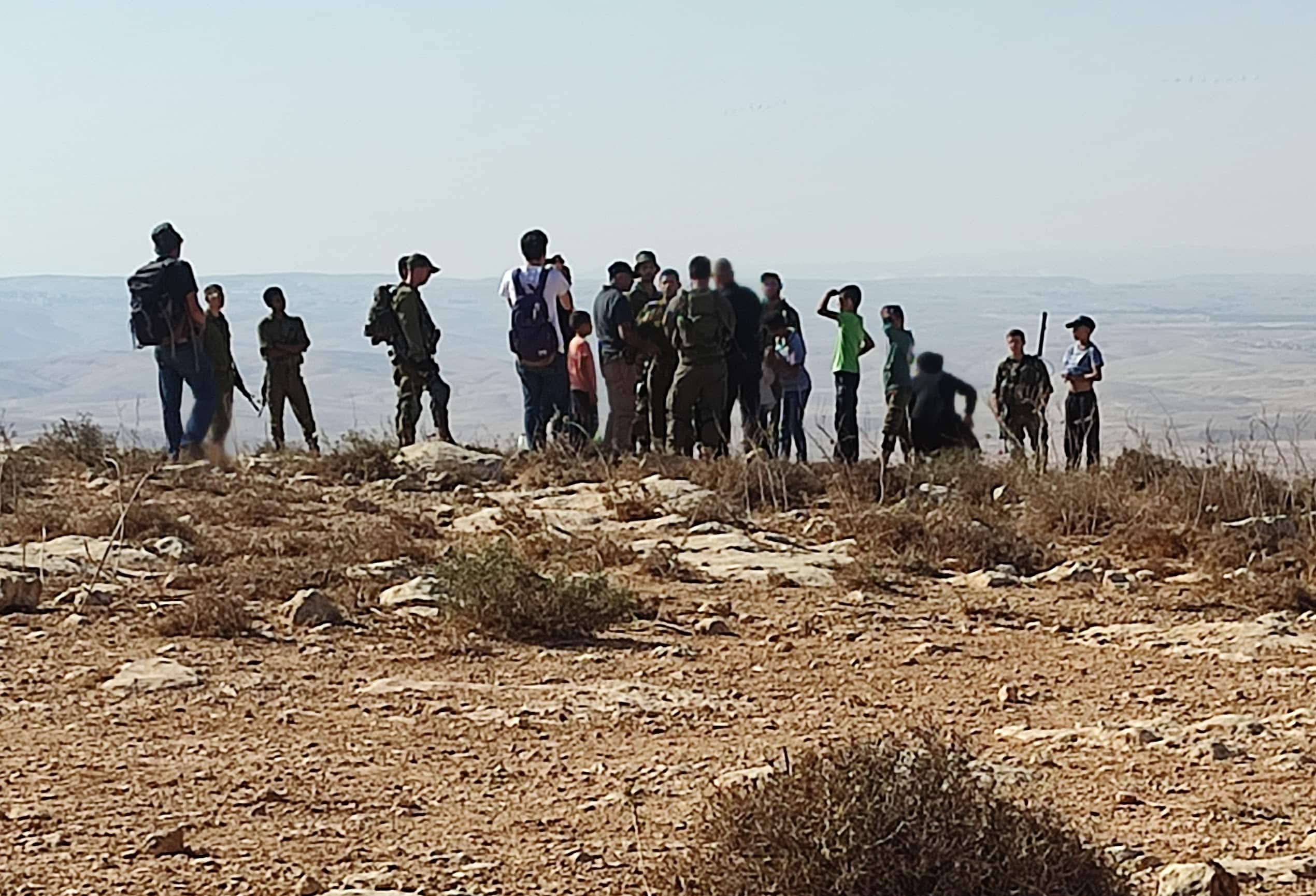
Palestinians and Israelis participate in land action in the South Hebron Hills
‘I do my activism so I can look at myself in the mirror each day’
*Lior sees his activism as being for both Israel and Palestine.
‘It’s a zero sum game. It shouldn’t be. It should be for both. I believe [as activists] we can reduce tension between the army and the Palestinians which can lead to less violence. I do my activism so I can look at myself in the mirror each day. What the Israeli army does in the West Bank is in my name. So I can’t look at myself if I don’t stand against that. I’m doing it so when my grandchildren ask me what were you doing during the occupation I can answer them.’
‘I first started doing the olive harvest each year and then about 18 months ago I started coming down regularly to the South Hebron Hills. At that time the settlers were being particularly aggressive towards people who were living in a small village called Um Fagarah. What I saw appalled me and I felt I had to go and support them. What I do is not necessarily to contribute towards political change; its not a political action in itself. Its to do with people. Supporting them. If I can help one person to keep his land that is something I have done that is worthwhile.’
‘Up to about six months ago I felt more optimistic, but now I see that every time I visit the South Hebron Hills there is more and more pressure on the Palestinians. Violations of international humanitarian law are increasing and, for example, more farmers are seeing their olive trees damaged by settlers. Until fairly recently the army used to stop settler violence against the Palestinians but not now. It seems there are no rules and the army has decided it is on the side of the settlers.’
Despite the deep challenges, many Palestinians in the South Hebron Hills tell us that the commitment displayed by Israeli activists and the internationals who stand in solidarity with them, gives them another reason to be hopeful and continue to resist the injustices of occupation.
*Real names witheld
Take action!
-
Since the beginning of the year, hundreds of thousands of Israelis have been protesting against Israel’s new ultra right-wing government, launching a large-scale resistance movement. Please sign this petition from the Refuser Network to show your support.
-
Watch the film, 5 Broken Cameras made by a Palestinian activist documenting the Israeli military’s excessive use force against peaceful Palestinian protest and the resilience of the Palestinian resistance movement.
-
Learn about the different Palestinian and Israeli peace and human rights organisations here, and follow and share their work on social media.

